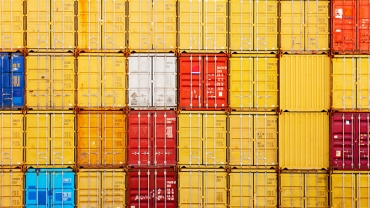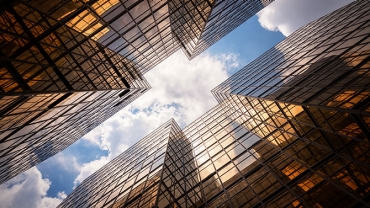
PwC Podcast: Ukraine’s news ad hoc #4. Customs regulation during martial law
21/04/22
Artem:
Good evening. We are on air from PwC Ukraine.
My name is Artem Krykun-Trush, I am an Attorney-at-Law, Manager with White Collar-Crime practice and we are continuing our special episodes of podcasts, PwC: Ukraine’s news ad hoc.
I would like to thank our followers for listening to our special series of podcasts. In our previous episode we discussed a pretty complicated topic, “Your property has been shelled. What should you do?” together with Dmytro Trut, Head of White Collar-Crime, PwC Legal Ukraine.
Today, we have prepared a highly discussed topic for you, Customs and new customs regulation developments during martial law. And we are joined today by the recognised expert in this field, Vita Miroshnychenko, Head of Customs Regulation and International Trade, PwC Ukraine. So without further ado, let's move on to our topic where we have prepared a whole bunch of interesting news and insights for you.
Artem: Vita, hi! How are you?
Vita: Artem, hi. In early February, my answer would be “All you need is AEO”, but this was a lifetime ago, so now my answer is, holding on. How are you?
Artem: Vita, the same but without AEO. So, shall we begin? I think we should start our conversation with imports of military/dual-purpose goods. We are all aware that these goods have the highest share in the country’s imports right now.
Vita: It’s true. To support our Armed Forces and other military formation, volunteers are bringing in aid, mostly from EU countries, everything from bulletproof vests to tactical goggles. Within this in mind, government simplified the procedure for admitting goods across the Ukrainian customs border. As of recently, the following items are now treated as humanitarian aid: bulletproof vest plates, mobile radio sets, drones, binoculars, barrel sights, thermal sights, night vision devices and other goods. All of the above is non-civilian in nature and is needed for prompt imports in Ukraine. So these goods can be imported based on the letter of guarantee from the ultimate recipient, which should be presented to customs authorities.
As for other military/dual-purpose goods, the rules have not changed and are described in relevant regulations.
Artem: Vita, can you tell us more about this letter of guarantee from the ultimate recipient? Where is one issued?
Vita: This letter is issued and stamped by the military agency identified by the Ministry of Defence of Ukraine, e.g. it can be provided by the Ukrainian Armed Forces General Staff, law enforcement authorities or any military formation. The format of the letter is regulated by the Cabinet of Ministers Regulation No 362, so it is easy to just use the template provided in the appendix.
Response: Artem, I don't think there would be any issues if you cross the border with a copy of such letter.
Artem: Another question from my practice. Units that are now in the field, somewhere deep in the woods, intelligence battalions. Volunteers have been procuring large volumes of aid, for them in particular. And I've had a situation when a letter was hand written on a sheet of A4 paper. Obviously, using anything with a letterhead or a stamp was out of question.
Vita: Under the regulation, such a letter has certain required content and must be certified by a stamp of a military agency, so if the letter is handwritten by includes all the required details and is certified by a stamp, I think there will be no grounds to deny customs clearance based on this letter.
Artem: This is now clear. I also see a lot of interest in the topic of car imports. I saw a post on your feed where you mentioned imports of cars in Ukraine free of customs payments. Is this the case? One can just go ahead and buy a car without any payments on top?
Vita: Yes, from 5 April and until martial law is lifted, our citizens have an opportunity to import a car for personal use without paying VAT, customs duties and excise tax. Cars should meet EURO-2 environmental standard and buses should meet EURO-5. Yet, the following expenses still remain: Pension Fund charge (3%-5% depending on the cost of car), service centre enrolment fee (up to UAH 1,000) and insurance policy (from UAH 350 up, depending on the engine capacity, place of registration, eligibility for discounts). Since 19 April, the State Customs Authority allowed individuals to self-declare cards without the requirement to engage a customs broker.
After martial law is lifted, individuals will not be required to compensate for any payments they are currently exempt from. No deferrals are provided by the law.
Artem: What about car dealers, can they also take advantage of such an extraordinary opportunity?
Vita: There are some nuances for car dealers. At the point of import, legal entities are only exempt from customs duties, i.e. they still need to pay VAT and excise tax.
By the way, Law 2142 also stipulates that there is no charge for customs formalities completed by customs authorities outside of their location or business hours. In other good news, the time of customs clearance has been reduced to 1 business hour. This applies to all goods imported by companies registered as Group 1, 2 and 3 unified tax payers.
Artem: Thank you, that’s clear. Let’s talk about humanitarian aid. We have all heard that the State has simplified imports of such goods. Could you summarise which processes have been simplified, for our understanding.
Vita: Effectively, the simplified procedure for imports of aid has been in effect since 1 March. As announced by the State Customs Service, customs authorities process, on average, 6 thousand tons of humanitarian aid on a nearly daily basis. For the duration of martial law, such shipments are allowed to pass Ukrainian customs border based on the simplified return only, prepared using a pre-defined template.
Artem: So a bunch of documents are no longer required and a letter from the military administration or humanitarian aid recipient is enough?
Vita: Everything is very simple now: when you cross the border, just present a return filled out by the individual carrying the goods, no permits required.
Artem: All clear, Vita, and how goods are eligible for imports as humanitarian aid?
Vita: Artem, all goods, except those explicitly prohibited, may be imported as humanitarian aids. As a customs officer commented to me, you can import even missiles, as long as they do not originate from the Russian Federation. On a more serious note, warfare and relate ammunition, narcotics and psychotropic substances, radioactive or explosive substances, etc. are not humanitarian aid.
Artem: I have another customs-related question and I feel a slight flashback to the first episode in our series of podcasts, when Vadym Romaniuk spoke about critical import goods. I know that it is a problem that the list of goods is expanded on an ongoing basis and no goods outside of the critical import list can be procured. So how does one find out which goods are on this list? And what do you think of the currency restrictions in place?
Vita: Artem, in my opinion, it is a pain point for businesses. Critical import goods are the goods that cannot be procured in Ukraine due to the military actions. Production of such goods has been stopped for various reasons. This list is approved by government and it is not exhaustive. The list has been amended 15 times (and counting). The issue is adding not only the goods code but also the description, which does not always match the classification code and vice versa.
In approving this regulation, government wanted to prevent the outflow of foreign currencies from Ukraine, which, I believe, was exactly the right thing to do. Yet, now, recovery of Ukrainian economy and business is a pressing matter, and this includes businesses that use imported raw materials and rely on imported goods to recover and sustain their operations. Importers of goods that, for various reasons, have not been added to the critical import list, are unable to procure such goods and pay to suppliers. This prevents them from operating in the normal course of business and recovering employment.
Artem: Vita, do I understand correctly that you believe that the NBU ban on payments for any goods outside of the critical imports list is no longer beneficial?
Vita: Exactly. For example, people have shared on social media photos of shelves with missing toothbrushes because they are not on the critical import list. This is the outcome of the regulation restricting imports. So my personal opinion is that a solution for government would be to either continuously monitor the critical import list with needs of businesses in mind, or to lift this restriction. Alternatively, an opposite concept could be implemented, where restrictions would apply to a limited number of settlement transactions in foreign currencies and goods permitted for imports would be “everything but...” This would allow applying restrictions on settlements in foreign currencies only for an insignificant range of goods
Artem: And finally, can you please also comment on the simplified customs clearance procedure. From our communications with our clients, we understand there are some issues with that.
Vita: In my opinion, the new Regulation 330 that governs the simplified customs clearance procedure, which is not in effect yet, has a number of conflicts with the passed Law 2142. For example: The Law introduces customs clearance of goods within 1 business hour for Group 1, 2 and 3 unified tax payers, while the Regulation provides for 10-minute customs clearance for simplified customs clearance procedure adopters, which is introduced by this regulation. The Regulation also provides for a so-called ‘simplified method’ of customs clearance, whereby the imported may present a preliminary customs declaration directly at the crossing point without any customs inspection or customs payments.
Hence, government effectively requires that importers adopt the ‘simplified method’ in order to be eligible for the customs duty, VAT and excise tax exemption. This conflicts with provisions of the Law on exemption from customs duties and VAT for goods imported by businesses. So, under the Law, the exemption from VAT is triggered solely by adopting the simplified tax system, whereas businesses are exempt from customs duties in any case.
In my opinion, there are more questions than answers but I believe the Regulation will be aligned with the law before in comes into effect.
Artem: Vita, thank you for the conversation.
Vita: Thank you! I wish our followers successful planning and quick completion of customs clearance formalities and everything will be Ukraine!
Everything will be Ukraine! Dear friends, as always, feel free to leave your questions in the comment section and share the episodes of our podcast with your friends, colleagues and family. More important updates ahead, so follow us on social media and keep up with the latest news. In the next episode we will discuss employment legislation and related changes during martial law with representatives from the Ministry of Economy and the State Labour Service. Stay tuned!
Follow PwC Ukraine channels:
Soundcloud Apple Podcasts Google Podcasts НВ Подкасти











